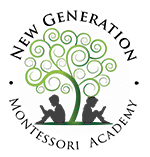Montessori Schools
Unique Educational Model
More than 4,000 Montessori schools dot the American landscape, offering a unique educational model to families nationwide. Thousands more bring the Montessori method to every corner of the world.
Montessori schools can be found in rural, urban, and suburban settings; in working-class towns, affluent communities, and even remote villages. Some schools offer all levels of learning, from infant/toddler through the secondary (high school) level. Others offer only certain levels.
In the United States, most Montessori schools are privately owned. A growing number, however, are part of public school systems, making it possible for families of any means to give their child a Montessori education.
Private & Public Schools
Private Schools
Linked by a common philosophy, each private Montessori school is nonetheless unique. It may be housed in a small, homelike setting, on an expansive campus, or surrounded by gardens that hold discoveries for every age. Individual schools may be part of a larger entity, often a nonprofit agency or religious institution. Some schools offer parent/infant classes, in which parents learn to observe their child and meet his needs in the Montessori way.
Like other private schools, most independently owned Montessori schools are funded by tuition revenue. Some schools provide scholarships for families in need of assistance, and many offer reduced tuition when parents enroll more than one child.
Public Schools
Montessori is a presence in more than 400 U.S. public schools, including neighborhood, magnet, and charter schools.
Public Montessori programs come in many sizes, from a single early-childhood classroom to an entire elementary, junior high, or high school. Some share a facility with other programs that have a different instructional approach.
Teachers in public Montessori schools have a dual responsibility. In planning an age-appropriate Montessori curriculum, they need to make sure it matches their state’s grade-level standards.
Public Montessori school students must take the same standardized tests as students in traditional public schools.
What’s in a Name
If you’re considering Montessori education for your child, it’s important to know that the Montessori name is not trademarked. Any school can call itself Montessori, and programs vary in how they interpret and practice the Montessori approach.
The American Montessori Society believes that certain elements are essential to quality Montessori education. These include—
mixed-aged classes, in which older children serve as role models and helpers;
a full array of developmentally appropriate Montessori learning materials;
teachers with credentials from a Montessori teacher education program;
adherence to the Montessori instructional approach, with teachers serving as guides rather than givers of information.
These and other standards are defined in AMS School Accreditation Standards and Criteria, and are required of schools that wish to be accredited by AMS.
All Montessori schools may opt to become AMS members, but only schools that have been accredited by AMS are affirmed as meeting AMS standards.
.
#WEAREMONTESSORI

